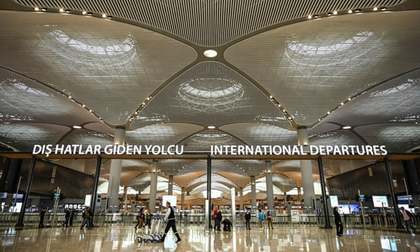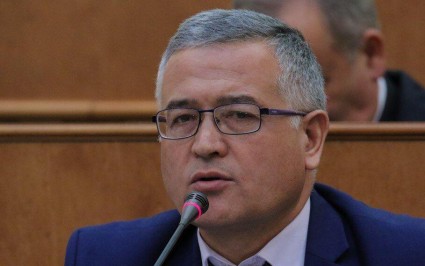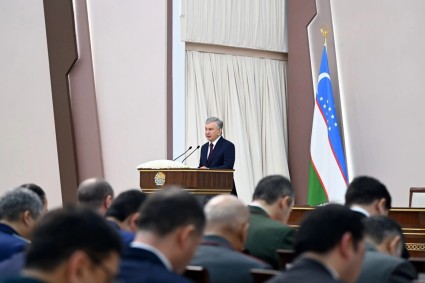A booming online industry specialising in fake passports with official visas and travel stamps is offering people with links to Islamic State the opportunity to leave Syria and travel onwards to the UK, EU, Canada and the US, a Guardian investigation has found.
One such network, run by an Uzbek with extremist links living in Turkey, is now selling high-quality fake passports for up to $15,000 (£11,132) purporting to be from various countries. In at least 10 cases the Guardian is aware of, people who illegally crossed the Syrian border into Turkey have used his products to depart through Istanbul airport.
Sellers claim the EU is the most popular destination but say in at least two cases people were able to travel from Istanbul to Mexico on fake Russian passports and, from there, illegally over the border into the US. Niger and Mauritania are also popular destinations, as are Ukraine and Afghanistan.
The Uzbek’s business is doing so well he recently opened a new channel on the encrypted messaging app Telegram with the official-sounding name “Istanbul Global Consulting”. The growing trade suggests that dangerous extremists could be slipping under the radar of security services around the world, escaping justice for past crimes and potentially able to continue terrorist activity in countries other than Syria.
“I do not ask about which group someone is with. I am willing to work with anyone,” the Uzbek said in a message chat with the Guardian, which posed as an interested client. “It is not my job to see who is bad and who is not. The security services should deal with it.”
Western security officials warned in 2015 that IS had managed to obtain significant equipment such as blank passport books and printers to make Syrian and Iraqi passports, which it used to disguise operatives among the more than 1 million people who fled to Europe during the peak of the refugee crisis. IS claimed several attacks around the continent shortly after, including the November 2015 attack on the Bataclan theatre in Paris and the Manchester Arena bombing in 2017.
Since then, European border agencies have invested in technology and personnel training to better identify forged passports. In 2020, Tajikistan totally overhauled its consular staff in Istanbul and document system in an attempt to stamp out the use of fake Tajik passports.
But in response, sellers of fake passports have also upped their game, using a wider variety of nationalities for prospective clients.
The Uzbek sent several videos of his wares, including crisp new French, Belgian, Bulgarian and Russian passports that appear to feature authentic security watermarks and holograms.
Fake passports supplied by Uzbek seller that allow ISIS members to enter Europe and the US – video
When placed under a black light, two Russian passports contain UV-sensitive materials designed to stop passport forgery, and a Belgian passport placed on a scanner similar to those used in airports appears to read correctly, with the holder’s details appearing on the monitor.
According to document sellers, it is impossible to fake a working biometric chip, but at many border crossings officials checking passports simply ignore those that don’t work, waving the passport holder through.
“There is a particular seller in Turkey who provides IS members with very high level [ie, well forged] documents,” using interlocutors who speak Russian, Arabic and other languages to cater for different clients, said a source at the US Department of Homeland Security.
“We are aware of IS members using these fake passports to cross to Europe, and European security is not successful in arresting them all.”
While the document sellers’ most popular service is providing documents for foreign fighters in Syria associated with IS and other armed groups to travel to Europe, the group has also identified new areas to expand.
On a Telegram chat for people in al-Hawl, a camp in north-east Syria home to about 60,000 women and children with links to IS, one of the Uzbek’s online marketers, a foreign woman detained in another camp nearby, has posted: “If you need fake documents from Russia, Central Asia, Turkey, Europe, DM me.”
The fall of Afghanistan to the Taliban had also created a new client base of Afghan refugees in Turkey, the Uzbek said. Although his services are too expensive for most displaced Afghans, he says his clients use the fake passports to board flights to western countries, and then claim asylum once they land.
While low-ranked IS fighters usually barely have money to buy one passport, high-level members who want to completely drop off the grid usually buy several documents from different countries, and use them to move around frequently, changing passport for every new flight or transfer, said a Russian passport seller.
A Russian national who fought for IS until 2015 said: “I had only a couple of hundred dollars when I came from Syria so I bought the cheapest passport – a really poor-quality Tajik passport. It did not work and I was arrested in the airport in Istanbul.
“Then my family back home collected enough money to buy a better-quality one. So I got a real Russian passport, but with my photo on it, and was able to get to Ukraine with it. It is a really good one – I was once stopped by police in Ukraine and they took it but returned it to me a week later saying everything is good. Unfortunately this passport is expiring now so I am currently trying to get money to buy a new one.”
To make sure a person disappears completely, for $500 the Uzbek seller can even offer a Turkish death certificate that can be sent to their home country’s consulate. “Unless you are Abu Bakr Baghdadi [The IS leader, killed in 2019] no one would go to the morgue to check if you really died. They would just accept that document and enter it into the system,” he said.
There are several passport options, depending on the clients’ ethnicity, languages they speak, where they want to go, and how much they have to spend. The cheapest documents with which to get to Europe are Russian, Kyrgyzstan and Kazakhstan passports, which cost about $5,000, or $6,000 as part of a Schengen visa package. Other popular and slightly more expensive options are Ukrainian and Moldovan papers, which allow visa-free travel to the EU.
The most expensive option is an EU passport, which will set a client back $8,000, usually requested by westerners and Arabs who speak some French and can pass for French or Belgian. Typically, an EU citizen arrives in Turkey on his or her own passport, sells it to the Uzbek and his colleagues for about €2,500, then the passport photo is changed to that of a client. The original owner of the passport then claims it has been lost and applies for a replacement at his or her consulate in Istanbul.
The passports are printed in their countries of origin and taken to the country where the client is waiting, where they receive official border entry stamps, which helps cement the legitimacy of the document.
“The passport itself relatively doesn’t cost anything. What does cost is the stamps,” said the Russian seller. “The majority of the money goes into bribes for stamps.”
“In the past the quality of passports on the market was bad so there was a limited number of countries one could travel to from Syria,” he said. “Now those passports are of such good quality that if you have enough money, you could go absolutely anywhere.”















